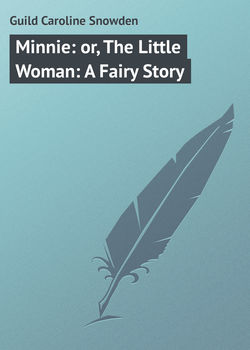Читать книгу Minnie: or, The Little Woman: A Fairy Story - Guild Caroline Snowden - Страница 4
CHAPTER III.
MINNIE'S HOME
ОглавлениеWe have found, from the history of Dandelion, that no one is too small to be of use. We have found that kind hearts may succeed where wise heads and strong arms fail; but perhaps you will wonder what Rodocanachi has to do with my story.
I'll tell you. Have you forgotten that I began to describe a beautiful little town, with roads that wound about like rivers, and houses set in the midst of garden-beds?
Great hills rose on every side, folding against each other as if they meant to shut out the rest of the world, with its noise, and trouble, and weariness. So the valley looked, from a distance, like a bird's nest lined with moss, and leaves, and long fine grass; and the houses and churches seemed like white eggs scattered among the greenery.
Or, if you stood in the centre, the slopes of the hills were so smooth and round, that the valley was like the inside of a painted bowl: – here were woods and waterfalls like pictures; here meadows of grass and grain; white patches of buckwheat, and the tender green of oat-fields, were striped along with brown potato-beds, and patches of dark-green tasselled maize.
In this gay-painted bowl, in this soft grassy nest, lived a little girl, whose name was Minnie, and whose history I mean to tell.
But what has it all to do with Rodocanachi?
Why, this: people say that the beautiful valley between the hills was nothing less than the inside of the giant's great brass helmet! Rivers had found their way through it now, and forests had rooted themselves on the sods that were spread by fairy hands; yet, deep down underneath, the helmet still was wedged among the rocks. Think what a giant Rodocanachi must have been, when you could thus put a whole town into his hat!
Whether the wonderful place in which she lived had anything to do with Minnie's strange history, I cannot tell. See what you think about it.
The house of Minnie's father was near the centre of the town, and in a street where there were many other houses. These were not joined together in a block, like city dwellings, but each had a garden and summer-house, and a patch of grass in front for the children's play-ground.
Around Minnie's house was a curious fence, made of thin strips of iron, bound at the top with a square board, painted white.
In the next house lived a boy named Frank. He was a bright, good-natured little fellow, just of Minnie's age, with rosy cheeks and curly hair, and as full of fun as he could be.
Minnie herself was very fond of play. Perhaps she played too hard, for she did not look hearty and rosy like Frank, but was slight and quick as a humming-bird, and fluttered about so from one thing to another, that it was more than her mother could do to keep her always in sight.
One minute she'd be seated quietly on the door-step, looking at the pictures in a book; the next she was away, and you only caught sight of her curls going round the corner of the house.
Or, perhaps, after you had looked for Minnie in the garden, she would start up with her laughing eyes from behind your very chair, and the next instant she was fluttering along the top of the fence, standing on one foot, and, with her bright pink dress, looking more like a flower than a little girl.
The iron strips of the fence were so far apart that Minnie could easily peep through, and could even crowd her little hand between the squares, to stroke Franky's curls, or pat his rosy cheeks.
As soon as breakfast was over, every morning, both Minnie and Frank would run to the fence, and talk and play there for hours.
But Minnie was not satisfied with this; she wanted to swing on the boughs of her father's young fruit-trees, and, as I told you, would climb the fence, and skip along the rail upon one foot.
Again and again her mother warned her that she might fall and kill herself, or at least soil and tear her dress, and that it was rude for little girls to be climbing trees and fences.
It was of no use. Even while she was talking, Minnie would clamber into some place so dangerous that her mother would have to run and take her down.
